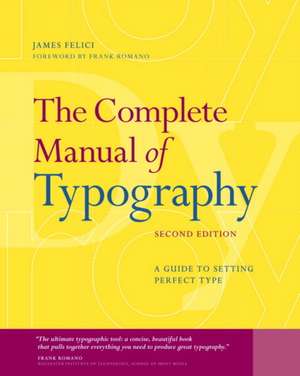The Complete Manual of Typography: A Guide to Setting Perfect Type
Autor Jim Felicien Limba Engleză Paperback – 30 iun 2011
Beautifully designed and richly illustrated The Complete Manual of Typography, Second Edition, is the fully updated version of THE seminal book on typography by Jim Felici. This book is about how type should look and how to make it look that way - in other words, how to set type like a professional. It explains in practical terms how to use today's digital tools to achieve the secret of good design: well set type. An essential reference for anyone who works with type: designers, print production professionals, and corporate communications managers can go to straight to the index to find focused answers to specific questions, while educators and students can read it as a text book from cover to cover.
You'll Learn:
- Basic Concepts and anatomy of good typography, indexed for quick reference by busy professionals
- How to manage fonts and handle corrupted or missing fonts on any operating system
- What makes good type good (and bad type bad)
- Techniques for working with measure, point-size, leading, kerning, and other type fundamentals
- Practical ways to fix composition problems such as loose lines, bad rags, windows, and orphans
- Hard-to-find rules for managing hyphenation and justification, indents, text wraps, and expert-set characters
- Secrets of how to wring out good type from uncooperative word-processing and layout problems
- The latest font technologies, including OpenType
- New typographic tools and improved font services in Operating Systems such as Windows and Mac OS
- New Techniques, and coverage of working methods such as style sheets.
- 35 page glossary of type terms
Preț: 373.12 lei
Nou
71.41€ • 74.27$ • 59.85£
Carte indisponibilă temporar
Specificații
ISBN-10: 0321773268
Pagini: 374
Dimensiuni: 203 x 255 x 15 mm
Greutate: 0.72 kg
Ediția:2
Editura: Adobe Press
Cuprins
Part 1: Typographic Basics 1 The State of the Art and How We Got Here 2 Units of Typographic Measurement 3 About Typefaces 4 About Fonts 5 The Basics of Using Typefaces 6 Typesetting versus Typewriting 7 Setting Type on a Personal Computer 8 What Makes Good Type Good (and Bad Type Bad) Part 2: How to Set Type 9 Measure, Point Size, and Leading 10 Controlling Hyphenation and Justification 11 Kerning and Tracking 12 Managing Indention and Alignment 13 Special Characters and Special Situations 14 Document Structures and Typographic Conventions 15 Tables 16 Language-Specific Issues 17 Typesetting with StyleSheets 18 Resolution Issues: Print, Screen, and Web part three References
Descriere
Beautifully designed and richly illustrated The Complete Manual of Typography, Second Edition, is the fully updated version of THE seminal book on typography by Jim Felici. This book is about how type should look and how to make it look that way - in other words, how to set type like a professional. It explains in practical terms how to use today's digital tools to achieve the secret of good design: well set type. An essential reference for anyone who works with type: designers, print production professionals, and corporate communications managers can go to straight to the index to find focused answers to specific questions, while educators and students can read it as a text book from cover to cover.
You'll Learn:
- Basic Concepts and anatomy of good typography, indexed for quick reference by busy professionals
- How to manage fonts and handle corrupted or missing fonts on any operating system
- What makes good type good (and bad type bad)
- Techniques for working with measure, point-size, leading, kerning, and other type fundamentals
- Practical ways to fix composition problems such as loose lines, bad rags, windows, and orphans
- Hard-to-find rules for managing hyphenation and justification, indents, text wraps, and expert-set characters
- Secrets of how to wring out good type from uncooperative word-processing and layout problems
- The latest font technologies, including OpenType
- New typographic tools and improved font services in Operating Systems such as Windows and Mac OS
- New Techniques, and coverage of working methods such as style sheets.
- 35 page glossary of type terms
